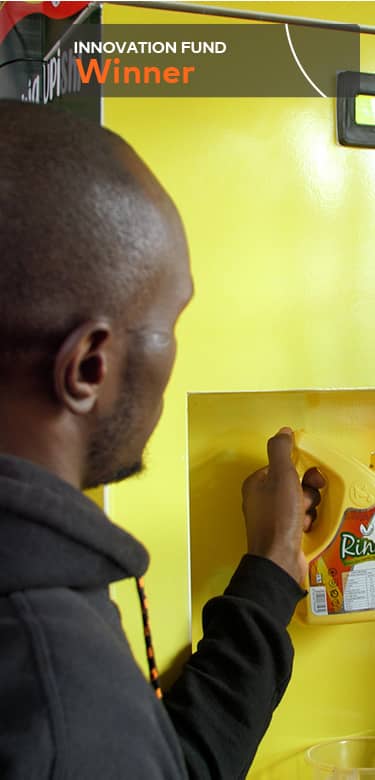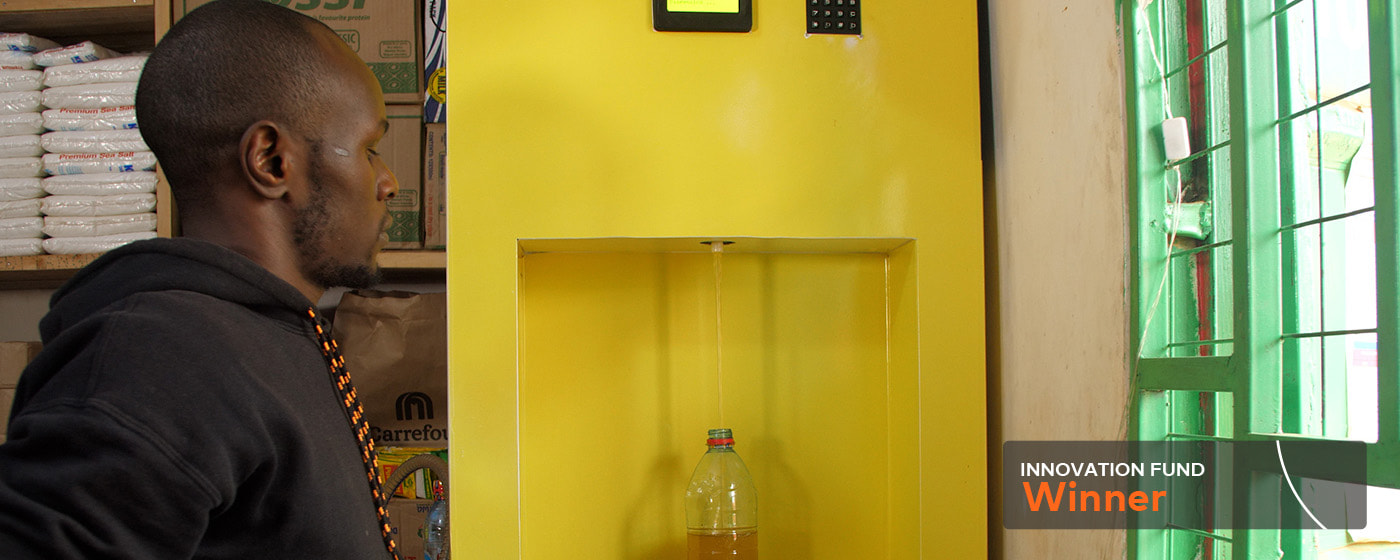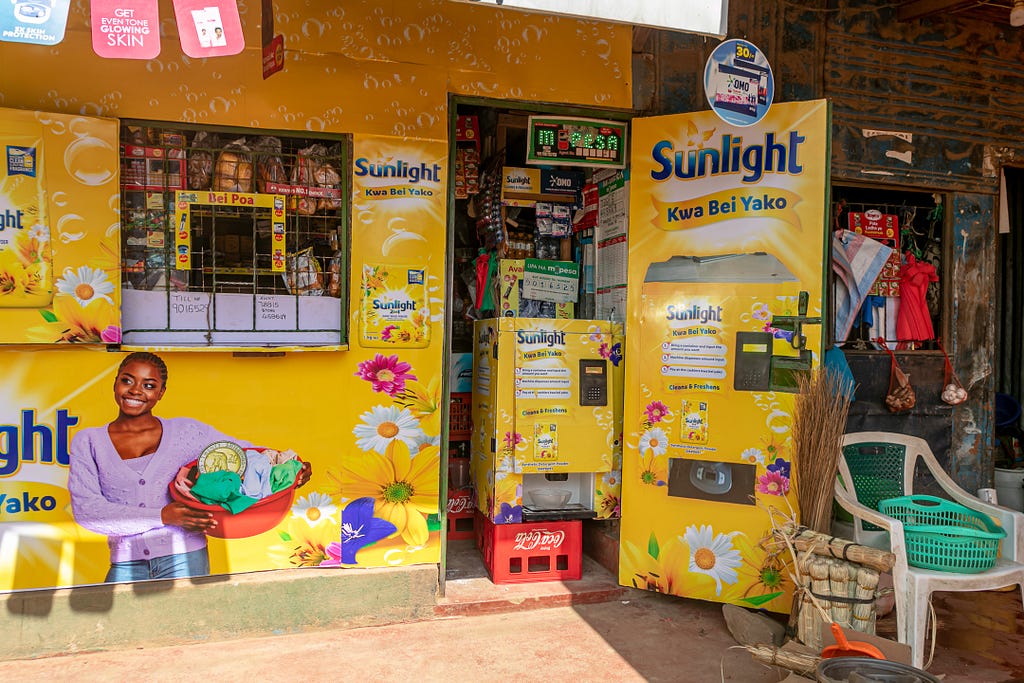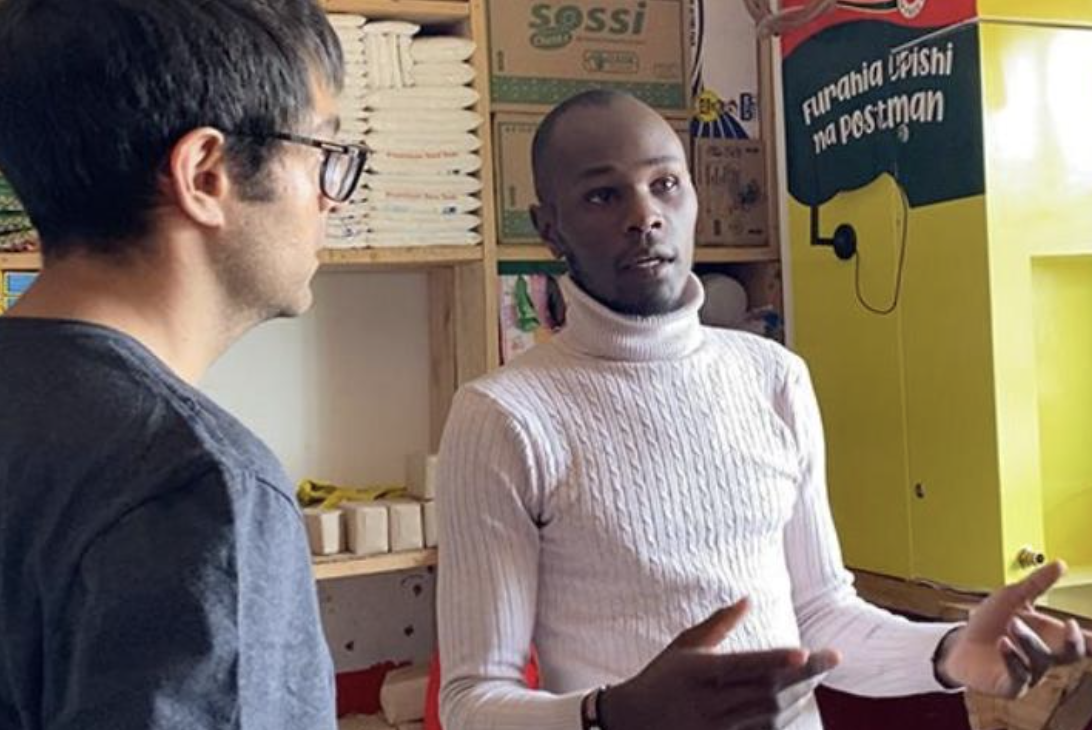Novek: IOT-enabled vending machines maximize sales for retailers
Innovation Fund Winner
Developing tech-enabled vending machines that dispense household staples to increase sales for retailers, reduce stockouts, and eliminate single-use plastics
Why this program?
Why this program?
- Micro-retailers are constrained by the fact that their customers want to buy household staples, such as cooking oil and washing powder, in varying quantities, but are unable to because of fixed packaging quantities. Further, smaller packet sizes cost disproportionately more for customers.
- Manufacturers of fast-moving consumer goods are also realizing the reality of the huge impact that single-use plastic has on the environment and are seeking solutions to reduce plastic packaging.
- Strive Community and Novek believe there is an opportunity for internet-enabled vending machines to grow the revenue of micro-retailers in addition to eliminating single-use plastic packaging.
Program overview
This program seeks to develop an Internet-of-Things (IOT)-enabled dispensing machine to enable small kiosk retailers in Kenya to reduce stockouts, increase sales by dispensing in quantities customers can afford, and eliminate single-use packaging.
Novek has already been piloting this in Kenya, where its machines enable retailers to dispense a range of quantities of oil that match varying consumer budgets (from US$0.5 to US$5).
With support from the Mastercard Strive Innovation Fund, Novek will develop an IOT-enabled vending machine for a new product: washing powder. Washing powder is a multibillion-dollar market globally—US$5.5 billion in India and US$3.6 billion in Indonesia—and the application of this technology could help boost retailer sales globally. This product is widely sold by micro-retailers, with demand for different quantities depending on customer needs. This machine will help micro-retailers better serve their customers, leading to more sales and revenue, by:
1. Enabling sales of very small quantities.
Today, small businesses are constrained by the fact that their customers want to buy household staples in varying quantities, but packaging quantities are fixed. Smaller packet sizes are simply unavailable for some product categories and cost disproportionately more per gram or milliliter when they are. This means that small businesses cannot adequately serve customers who are only able to purchase micro-amounts, often on a daily basis—a consumer preference that is common in low-income areas. Novek’s vending machine will enable businesses to dispense micro-quantities of washing powder, from as little as 100 grams. This will give businesses the opportunity to increase their customer base and sell more. The impact of this has been proven by Novek’s cooking oil dispensing machines, which have led to a 50% to 100% uplift in sales for retailers.
2. Reducing stockouts.
One of the biggest challenges for small retailers is that they are unable to obtain a consistent supply of commodity products. Stockouts represent missed sales and lost revenue, and potentially the erosion of customer loyalty. As Novek’s dispensing machines are tech-enabled, they can give distributors real-time visibility into a retailer’s inventory and trigger the restocking process. This increase in supply chain reliability should lead to an uptick in sales and customer satisfaction.
3. Increasing profit margin through saved packaging costs.
Manufacturers will pass on part of the savings generated from eliminating packaging cost to micro-retailers. This could represent a significant revenue increase per unit, particularly for small quantity purchases, where packaging can represent between 30% to 40% of the cost of the product.
4. Boosting ability to compete with larger retailers.
The dispensing machine will enable small businesses to guarantee their customers that the product they dispense is genuine and hygienic, giving them the ability to compete with larger retailers that are increasingly encroaching on their customer base.
These benefits to the retailer are all complemented by the significant reduction in single-use plastic. Plastics account for 15% of the world’s carbon budget, they are a major driver of climate change, and they are extremely damaging to marine environments. Encouraging fast-moving consumer goods companies to consider distribution models that reduce plastics in the supply chain could significantly reduce carbon emissions.
About Novek
Novek builds IOT technology for dispensers and vending machines for micro-retailers. These machines are placed at kiosks (micro-employers that are owner-operated or have one to two employees) and dispense quantities of product that match varying consumer budgets while eliminating packaging. The tech platform provides distributors visibility that allows both them and small businesses to maximize sales.
“Small businesses are key to our success as a company. Here in Kenya they represent 70% of retail revenues. We believe that if we improve both the product they deliver to customers and their incomes, we will ultimately drive economic prosperity for everyone.”
Zahid Mitha
CEO, Novek
Share this article



